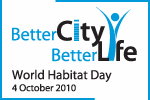| |
UN International Days for community activities
|
The United Nations was built on spiritual principles and
universal values such as peace, human rights, human dignity and worth,
justice,
respect, good neighbourliness, freedom, respect for nature and shared
responsibility.
This
year we are featuring International Days in each month that could
provide
opportunities for partnership activities within our communities. In
this issue
we share ideas for:
World
Habitat Day on October 4, World Mental Health Day on October
10, International
Day for the Elimination of
Violence against Women on November 25 and International
Day of Persons with
Disabilities on December 3, 2010. |
|


|
October 4 World
Habitat Day
The idea of World Habitat Day is
to
reflect on the state of our towns and cities and the basic right of
all, to
adequate shelter. It is also intended to remind the world of its
collective
responsibility for the future of the human habitat.
The
United Nations chose the theme Better City, Better Life
to highlight our collective
vision of a sustainable urban world that harnesses the potential and
possibilities, mitigates inequalities and disparities, and provides a
safe home
for people of all cultures and ages, both rich and poor.
It is projected that in the next
generation, 70 percent of humanity will be living in towns and cities.
So this
is the time for us to look closely at urban life and how we can ensure
our
wellbeing on all levels. How can we live fit and healthy lives within
our
cities and towns? How can we develop our sense of a community and help
build
relationships within it? Are there members of our community who are
isolated
because of age, health or other factors? … and what can we do to help?
We could also use this day to
focus
on the issue of homelessness which is a reality in our cities. What can
we do
to help on both a long term and an immediate basis? What community
organisations
could we work with?
For
more information see the UN website: http://www.unhabitat.org/
|
|
October 10 World
Mental Health Day
World Mental Health Day raises
public awareness about
mental health issues. The Day promotes more open discussion of
illnesses, and
investments in prevention and treatment services. WHO statistics for
2002 show
that 154 million people globally suffer from depression, only one form
of
mental illness.
Mental, neurological and
behavioural disorders are
common in all countries around the world, causing immense suffering and
staggering economic and social costs. People with disorders are often
subjected
to social isolation, poor quality of life and higher death rates.
World Mental Health Day could be
used to focus
attention on the needs of people with mental health disorders, provide
information and challenge discriminatory practices. The World Health
Organisation
has suggestions on their website at:
http://www.who.int/mediacentre/events/annual/world_mental_health_day/en/index.html
and www.youtube.com
has related videos.
|
 November 25 November 25
International Day for the Elimination of Violence against Women
Violence against women and girls
is a problem of
pandemic proportions. At least one out of every three women around the
world
has been beaten, coerced into sex, or otherwise abused in her lifetime
– with
the abuser usually someone known to her.
Frequently abuse leads to mental
and psychological
problems for both women and children, as well as homelessness.
See the UN site for
information at:
http://www.who.int/mediacentre/events/annual/elimination_vaw/en/
The International Day for the
Elimination of Violence
against Women also launches the 16 Days of Activism Against Gender
Violence,
which runs through to 10 December, Human Rights Day.
The 16 Days of Activism Against
Gender Violence is an international campaign that is used as an
organising strategy by
individuals and groups around the world to call for the elimination of
all forms of
violence against women. You can get involved on-line through the Centre
for Women's Global Leadership at:
http://www.cwgl.rutgers.edu/16days/home.html
The Centre will also
supply a free copy of an action kit that includes a bibliography and
resource
list, a list of suggested activities and supplemental information
relevant to
this year's theme.
|
 December 3 December 3
International Day of Persons with Disabilities The World
Bank estimates that 20
per cent of the
world’s poorest people have some kind of disability, and tend to be
regarded in
their own communities as the most disadvantaged.
The Day aims to promote a better
understanding of
disability issues with a focus on the rights of persons with
disabilities and
gains to be derived from the integration of persons with disabilities
in every
aspect of the political, social, economic and cultural life of their
communities. The goal of full and effective participation of persons
with
disabilities in society and development was established by the World
Programme
of Action concerning Disabled Persons, adopted by the United Nations
General
Assembly in 1982.
The theme for 2010 is Keeping the promise: Mainstreaming disability in the
Millennium
Development Goals towards 2015 and beyond.
There are numerous
ways in which TOS groups and individual members can support the intent
of the
International Day of Persons with Disabilities. The following ideas and
more
come from their website: http://www.un.org/disabilities/
|
|
Involve: Observance of the Day provides
opportunities for participation by all interested communities –
governmental,
non-governmental and the private sector – to focus upon catalytic and
innovative measures to further implement international norms and
standards
related to persons with disabilities. Schools, universities and similar
institutions can make particular contributions with regard to promoting
greater
interest and awareness among interested parties of the social,
cultural,
economic, civil and political rights of persons with disabilities.
Organise: Hold
forums, public discussions and information
campaigns in support of the Day focusing on disability issues and
trends, and ways
and means by which persons with disabilities and their families are
pursuing
independent lifestyles, sustainable livelihoods and financial security.
|
Celebrate: Plan and organise performances
everywhere
to showcase – and celebrate – the contributions by persons with
disabilities to
the societies in which they live, and convene exchanges and dialogues
focusing
on the rich and varied skills, interests and aspirations of persons
with
disabilities.
Take action: A major
focus of the Day is practical action to
further implement international norms and standards concerning persons
with
disabilities and to further their participation in social life and
development
on the basis of equality. The media have especially important
contributions to
make in support of the observance of the Day – and throughout the year
–
regarding appropriate presentation of progress and obstacles in
implementing
disability-sensitive policies, programmes and projects and to promote
public
awareness of the contributions by persons with disabilities. |
|
|
